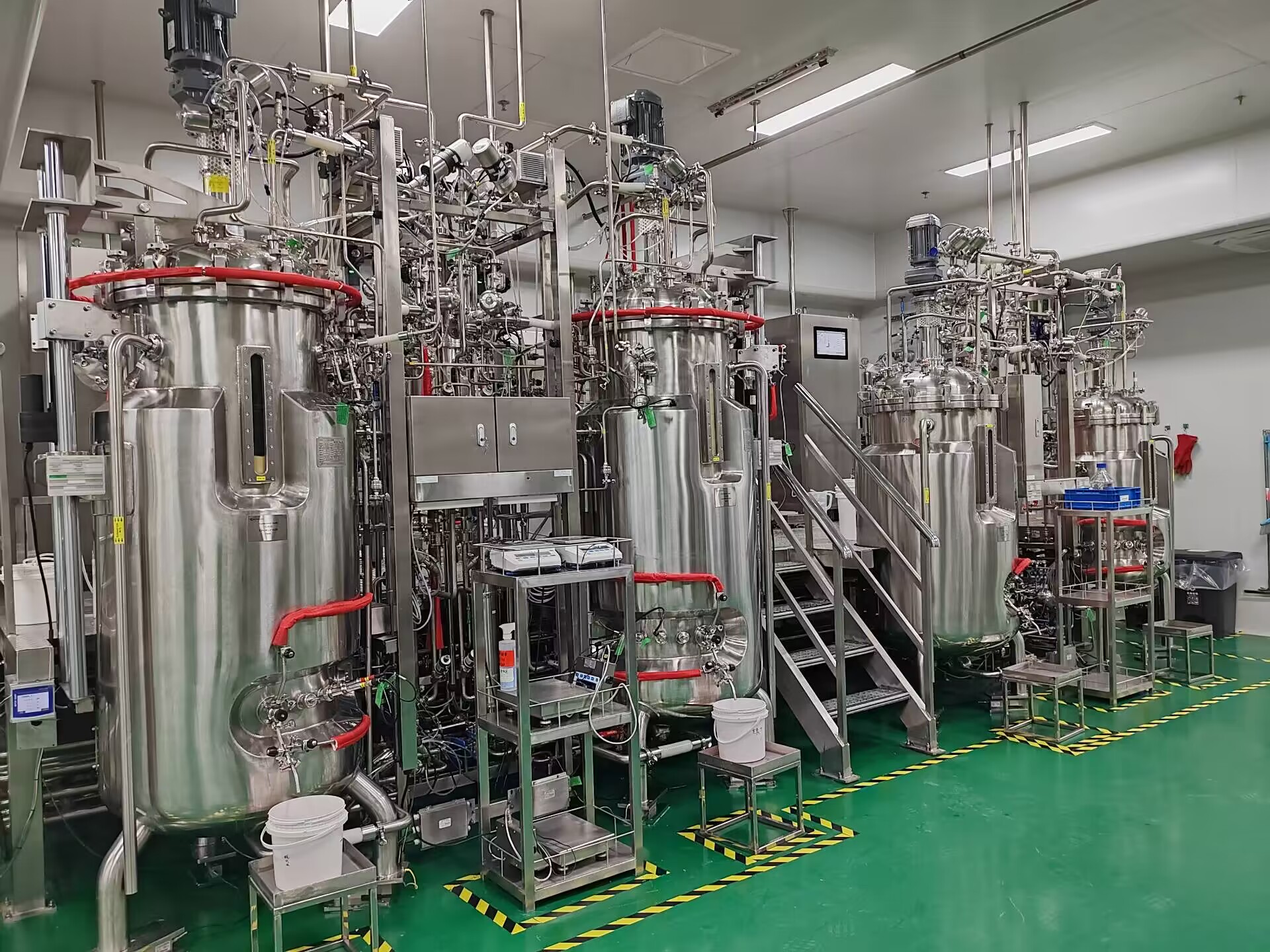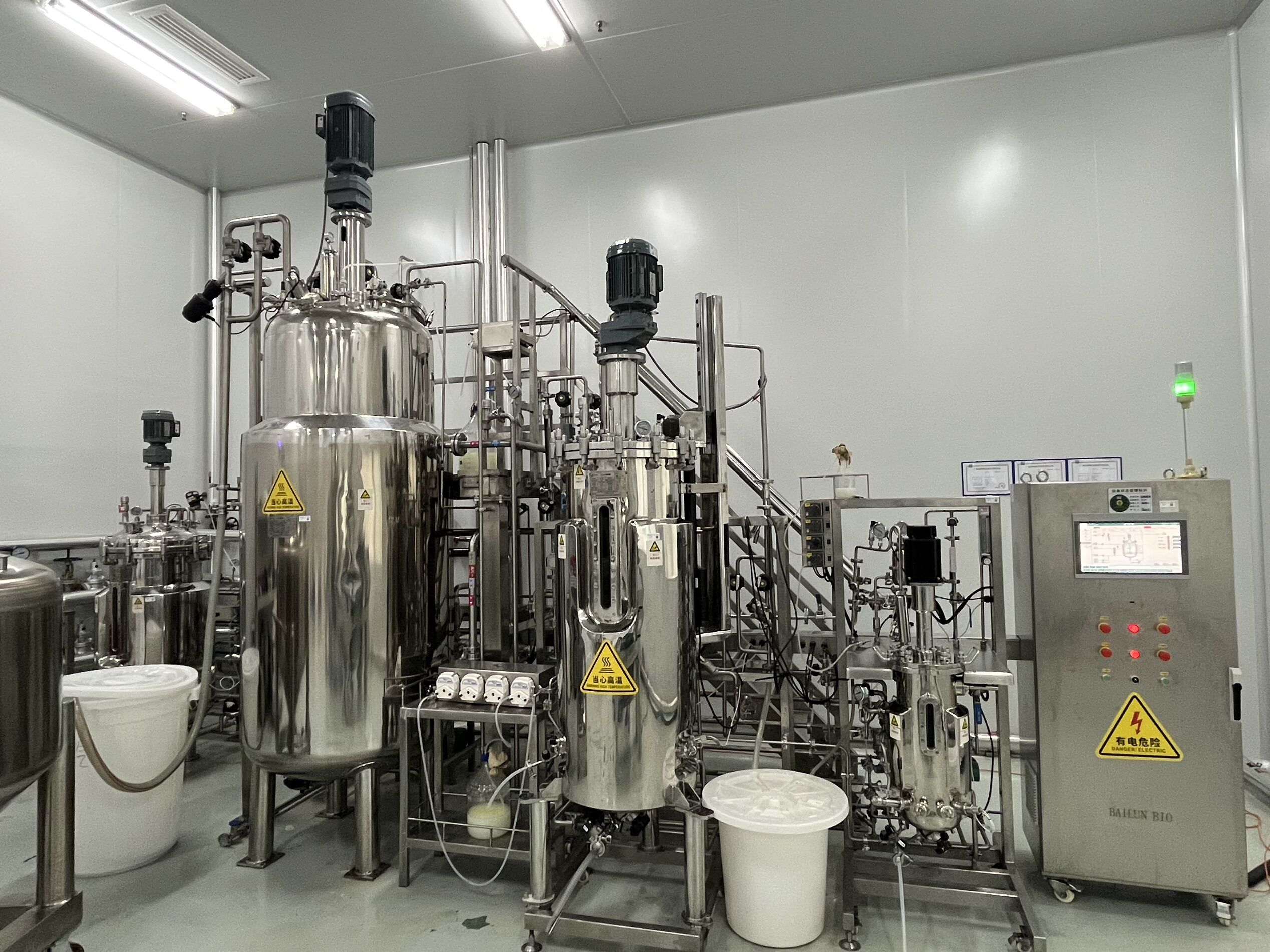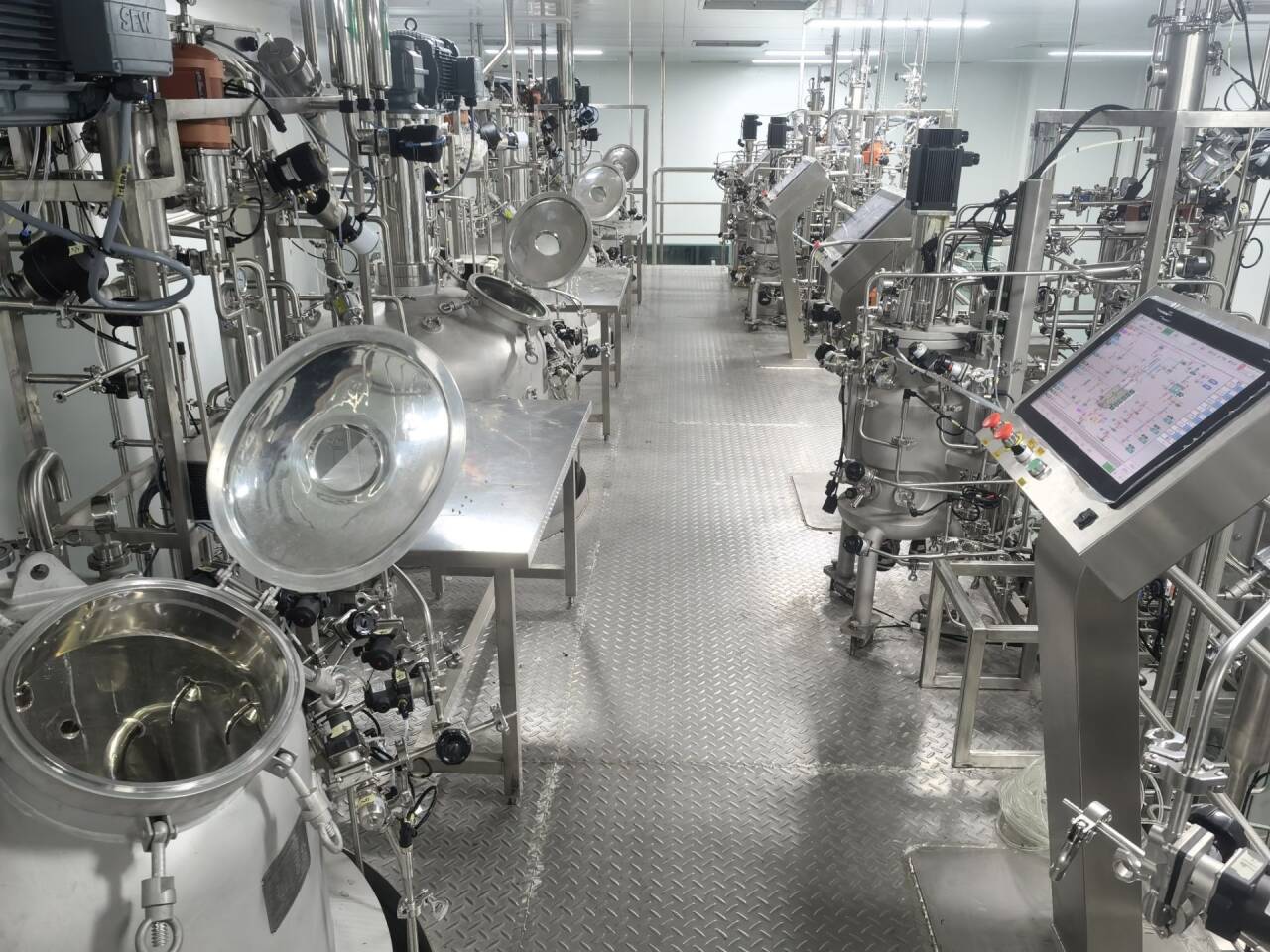Fermenter/Bioreactor
- Mini Glass Fermenter
- Lab and Pilot Scale Fermenter
- Pilot and Production Scale Fermenter
- Multi Stage Stainless Steel Fermenter
- Magnetic Stirring Fermenter
- Solid State Fermenter
- Enzyme Bioreactor
- Cell Culture Fermenter
- Vaccine Production Fermenter
- Inactivation Tank
- Mixing Tank Ingredients Tank
- Airlift Fermenter
- Spray Dryer
- Glass Bioreactor
- Multistage Glass Fermenter
- Light(photo) Fermenter
- Centrifuge
- blog
General Info
Fermentation is one of the most important biological processes in the world — in both its old and new forms. Historically, it was used for making wine and food preservation, but in biotechnology its applications have grown exponentially. Today, it is used for high tech purposes like biopharmaceuticals, biofuels and more. And as biotech continues to evolve, the role of fermentation in developing sustainable solutions grows more important. In this article we will look at the biology of fermentation and how it’s driving the advancement in biotechnology. Understanding this will help you see how it can solve some of the world’s biggest problems from health to sustainability.

What is Fermentation?
Simply put, fermentation is a metabolic process where organic substrates – usually carbohydrates like sugars – are converted into chemical compounds by enzymes produced by microorganisms. This happens under anaerobic conditions meaning no oxygen is present. The microorganisms involved in fermentation – yeast, bacteria and moulds – do this to generate energy and produce various metabolic by-products that are used in food, beverages and industrial applications.
Fermentation serves two main purposes that are vital for many microorganisms to survive especially in environments where oxygen is scarce or non-existent. These are:
1. Energy Formation: Fermentation is required for microbes to produce ATP when there is no oxygen available. This process makes them able to survive in low-oxygen environments such as deep soil, guts or swamps. In yeast, the glucose oxidation of fermentation yields ethanol and carbon dioxide, key byproducts of brewing and baking.
2. By-product Formation: Fermentation also gives the important by-products, like ethanol, lactic acid, & carbon dioxide, that are used for many things. We’re using ethanol in beer and biofuels, lactic acid in dairy products and biodegradable plastics, carbon dioxide in baking to make the dough rise. These results underscore fermentation’s value in various sectors.
In short, fermentation is not just a way for microorganisms to survive but a biochemical process that has built many of the world’s food, beverage and industrial systems.
Types of Fermentation
Although a broad biological process, fermentation can be broken down into distinct types depending on the microbes that power the process and the end product produced. The most common types of fermentation are:
● Alcoholic Fermentation
● Lactic-Acids Fermentation
● Butyric-Acids Fermentation
● Propionic-Acids Fermentation
● Acetone-Butanol Fermentation
Each type of fermentation has its own unique applications and characteristics.
Fermentation Type | Key Features |
Alcoholic Fermentation | - Produces ethanol and carbon dioxide as byproducts - Facilitated by yeast (Saccharomyces cerevisiae) - Used in beer, wine, and biofuel production |
Lactic Acid Fermentation | - Produces lactic acid as the primary byproduct - Involves lactic acid bacteria like Lactobacillus, Streptococcus, and Leuconostoc - Used in food preservation and the production of fermented foods like yogurt, kimchi, and sauerkraut |
Butyric Acid Fermentation
| - Produces butyric acid as the main byproduct - Carried out by Clostridium butyricum and other bacteria - Used in the production of certain chemicals and biofuels |
Propionic Acid Fermentation | - Produces propionic acid as the primary byproduct - Involves propionic acid bacteria like Propionibacterium - Used in the production of Swiss cheese and as a food preservative |
Acetone-Butanol Fermentation
| - Produces acetone and butanol as the main byproducts - Facilitated by Clostridium acetobutylicum and related bacteria - Used in the production of solvents, biofuels, and other chemicals |
Fermentation in Biotechnology
Fermentation is a key part of biotechnology where valuable products are produced through microbial fermentation. Biotechnology uses living organisms, cells or their components to develop products and processes that benefit society from medical therapies to energy sources.
1. Fermentation in Pharmaceutical Production
In biotechnology, fermentation is used for production of drugs and biopharmaceuticals. Many therapeutic agents including antibiotics, hormones and vaccines are produced through fermentation processes.
● Antibiotics Production: Fermentation is used to produce antibiotics like penicillin and tetracycline. Fungi and bacteria like Penicillium and Streptomyces species are used in fermentation tanks to produce these life savers. These microorganisms metabolize natural substrates to produce antibiotics which are later extracted and purified for use.
● Hormone Production: Fermentation is also used in hormone production especially for insulin. The insulin produced through recombinant DNA technology relies on microbial fermentation. Genetically engineered bacteria or yeast are used to produce human insulin which is then harvested and purified for diabetes treatment.
● Vaccine Production: Fermentation processes are used in vaccine development as well. Microbial cultures grown in bioreactors undergo fermentation to produce antigens used in vaccines. Influenza vaccine and hepatitis B vaccine are examples of vaccines that uses fermentation technology.

2. Fermentation in Biofuels
With the rise of renewable energy, fermentation is becoming a major player in biofuels. Ethanol, a type of alcohol, is fermented from starches or sugars. It’s a biofuel alternative to fossil fuels, reducing carbon emissions and being sustainable. Fermentation is used in biogas (methane) production too. Also, microbes break down food waste and agricultural waste to produce methane gas that can be used to generate electricity or fuel vehicles.
3. Fermentation in Food and Beverage
The food and beverage industry has been using fermentation for centuries to produce many products, many of which we eat daily. From bread to cheese, fermentation is for preservation and flavor.
● Bread Making: The fermentation process in bread making involves yeast that ferments the sugars in the dough to produce carbon dioxide and alcohol. The gas makes the dough rise and gives bread its lightness.
● Dairy Products: Lactic acid fermentation turns lactose (milk sugar) into lactic acid, And this is what makes yogurt, cheese and buttermilk flavorful and preserveable.
How Fermentation Benefits Biotechnology
Fermentation is not only a process for producing food and beverages but also a powerful tool in biotechnological advancements.
1). Environmental Sustainability
Fermentation helps with environmental sustainability by providing green alternatives to chemical manufacturing. Microbes in fermentation processes produce fewer toxic by-products and a smaller footprint.
● Waste Recycling and Resource Efficiency: Many fermentation processes use agricultural or industrial waste as feedstock. This is waste recycling and resource efficiency. For example agricultural waste like crop residues can be converted into biofuels or biodegradable plastics and reduce waste in landfills.
● Biofuels and Green Energy: Fermentation is key to biofuels, a more sustainable alternative to fossil fuels. By using renewable biomass fermentation can reduce the carbon footprint and greenhouse gas emissions of traditional energy sources. Bioethanol from corn or sugarcane is one of the most widely used biofuels produced via fermentation.
● Biodegradable Plastics: The fermentation process can also be used to produce biodegradable plastics. Polylactic acid (PLA) a biodegradable plastic made from fermented sugars is a cleaner alternative to petroleum based plastics.
● Key Benefits include: Fewer toxic by-products, recycling of agricultural and industrial waste, production of biofuels and biodegradable materials, and reduced greenhouse gas emissions.
2). High Throughput and Productivity
Fermentation is high throughput and can be scaled from lab to large industrial operations with precision. This scalability is perfect for high volume products.
● Scalability: One of the biggest advantages of fermentation is its ability to be consistent across different scales. Whether in a lab or large industrial operation the fermentation process can deliver consistent product quality and high yields.
● Cost Savings: Fermentation efficiency reduces overall costs. By optimizing temperature, pH and nutrient availability you can produce more while wasting less. For example fermentation of insulin or antibiotics has become more cost effective due to optimized fermentation conditions.
● Mass Production: Fermentation allows for mass production of products like insulin, antibiotics, biofuels and enzymes. So there’s a steady supply of these products to meet global needs.
● Key Benefits include: Scalable from lab to industrial scale, consistent product output with high yields, lower costs through optimization, and meeting global demand for bioproducts

3). Innovation and Genetic Engineering
One of the coolest things about fermentation in biotech is the role of genetic engineering in fermentation. With the advent of genetically modified organisms (GMOs) we can create microorganisms that can produce more of what we want.
● Genetically Engineered Microorganisms: Through genetic engineering we can modify bacteria and yeast to produce more of a specific compound. For example genetically engineered E. coli or S. cerevisiae are used to produce insulin, antibiotics and biofuels. We can optimize these organisms to produce more of the desired product with higher efficiency.
● Humanized Products: One of the biggest achievements in biotech is the production of human insulin from genetically modified bacteria. Before genetic engineering insulin was extracted from animal pancreases which was expensive and had risks. Now genetically engineered bacteria produce insulin that is identical to human insulin so it’s safer and more effective.
● Synthetic Biology and Metabolic Engineering: Synthetic biology and metabolic engineering take fermentation to the next level. By designing and building new metabolic pathways scientists can get microorganisms to produce entirely new compounds like new biofuels or pharmaceuticals.
● Key Benefits include: Genetically engineered organisms for more production, safer and more effective humanized products (e.g., insulin), ability to produce new compounds through synthetic biology, and better product purity and efficiency in industrial fermentation
4. Pharmaceutical Production
Fermentation has been a big part of the pharmaceutical industry especially in the production of antibiotics and other essential pharmaceuticals. Traditional fermentation has been greatly improved through genetic modifications to produce better drugs more efficiently.
● Antibiotics: Production of antibiotics like penicillin relies heavily on fermentation. With fermentation technology we can produce antibiotics in large quantities so they are available worldwide for medical use.
● Biopharmaceuticals: Fermentation is also used to produce biopharmaceuticals like monoclonal antibodies, hormones (like insulin) and enzymes used in various treatments. The ability to engineer microorganisms to produce complex biologic drugs has changed the treatment of many diseases.
● Key benefits include: Production of life saving antibiotics and biopharmaceuticals, better drug quality and production scale, and meeting the global demand for essential medicines
Fermentation and its Impact on Sustainable Practices
Sustainability is big these days and fermentation is a green alternative to many chemical processes. Using renewable biological systems to produce high value products fermentation is part of the circular economy. Here are a few ways fermentation is sustainable:
1. Renewable Feedstocks
Fermentation allows us to use renewable, often waste based, feedstocks like agricultural residues, wood or food scraps to produce valuable products. This reduces our reliance on fossil fuels and prevents waste from ending up in landfills and reducing pollution.
2. Chemical Pollutants
Fermentation uses milder reaction conditions than traditional chemical processes which require high temperatures and harsh chemicals. This makes fermentation more energy efficient and environmentally friendly. It also reduces the production of hazardous by-products which are common in conventional manufacturing methods.
3. Carbon Neutrality
Bio-based products produced through fermentation can be carbon neutral. For example biofuels produced through fermentation can absorb CO₂ during plant growth and the CO₂ released during combustion is offset by the CO₂ absorbed during the plant’s growth phase. This closed loop system reduces the overall carbon footprint of energy production.
4. Waste to Resource
Fermentation can convert waste into useful products. For example agricultural waste can be used as feedstock for biofuels or biochemicals, what would otherwise be discarded can be turned into valuable resources for energy or industrial applications.
Conclusion: Fermentation in Biotechnology
In conclusion fermentation plays a crucial role in biotechnology. It is a highly adaptable and scalable process that supports innovation in both traditional and modern biotechnology applications. And BaiLun Biotechnology, with its expertise in bioreactor technology, enables precise and efficient fermentation processes, ensuring high-quality outputs across various sectors. BaiLun's fermentation systems, such as Solid Fermenters and Mammalian Cell Culture Bioreactors, are designed to optimize production, minimize waste, and enhance sustainability. As biotechnology moves forward the integration of advanced fermentation technology will drive the next wave of scientific and industrial breakthroughs. For businesses looking for fermentation solutions BaiLun Biotechnology has the products and expertise. Get in touch with us today to learn more!
